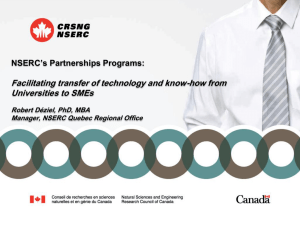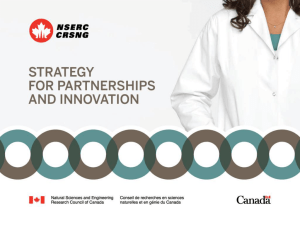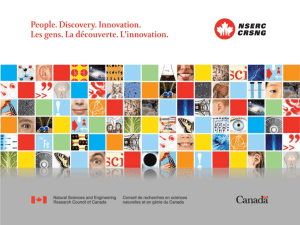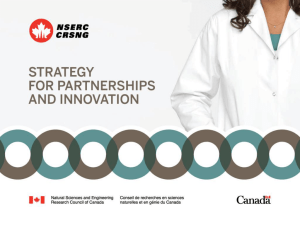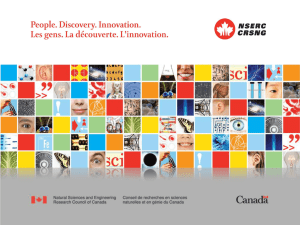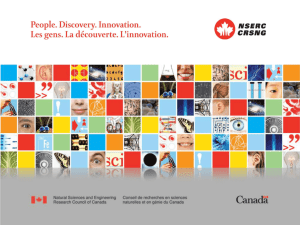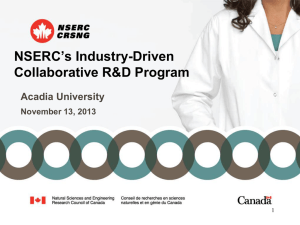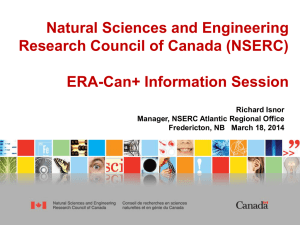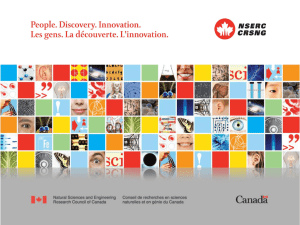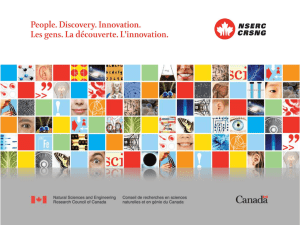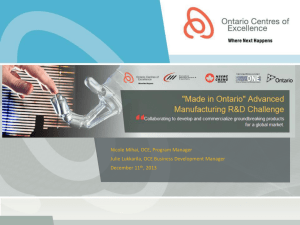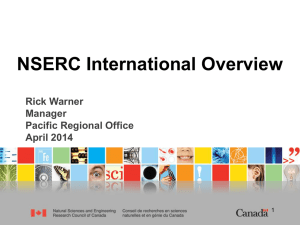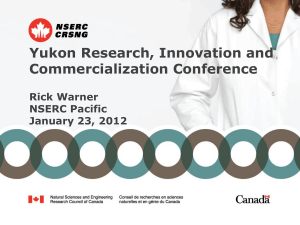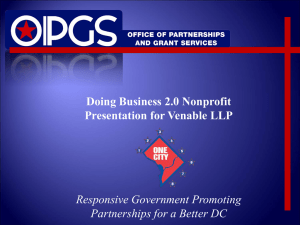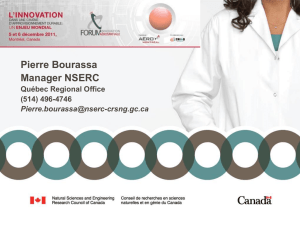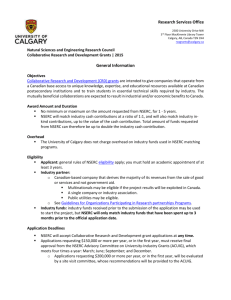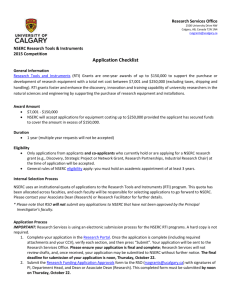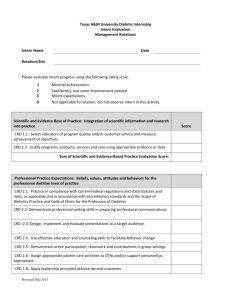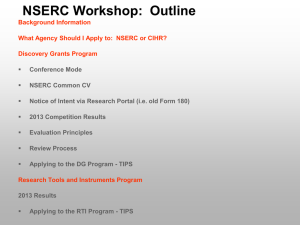NSERC_Irene Mikawoz
advertisement
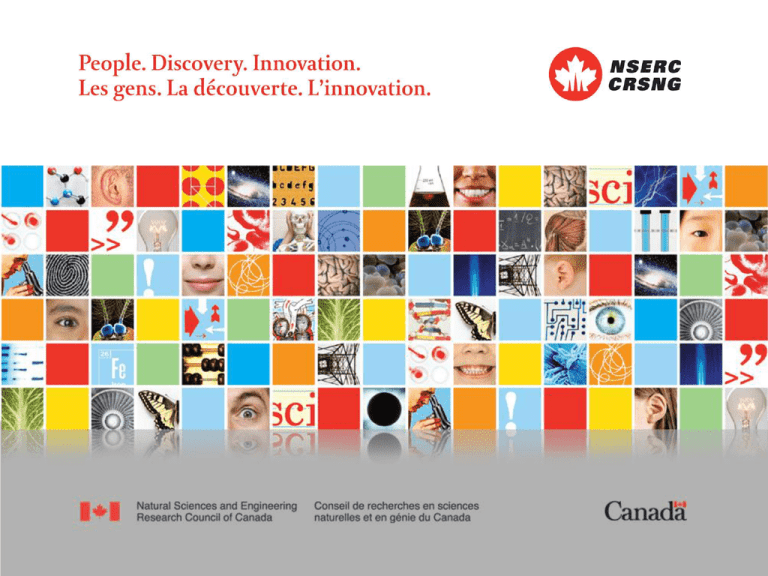
My goals today 1. Quick overview of NSERC 2. Highlight NSERC programs that can help you with your Research and Development work. 3. Answer your questions What We Do at NSERC • We invest more than $1 billion every year in people, discovery and innovation Over $250 K Innovation Programs Budget 2009-10 Strategic Partnerships $108.4 - 42.5% Networks of Centres of Excellence $49.9 - 19.6% CMC $8.8 - 3.4% Research Agreements $4.7 - 1.8% Technology Transfer Programs1 $36.7 - 14.4% Collaborative R&D $46.2 - 18.1% Total: $255M Research Partnership Programs (RPP) Maximize the value of public investments in university research by Supporting creation and transfer of knowledge Ensuring people are trained to create and use that knowledge Stimulating public-private R&D partnerships A key focus for our regional offices RPP Tool Box Strategic Partnerships (targets national priorities) Industry-Driven (Industry participation) • Strategic Projects • Strategic Networks • Collaborative R&D • Industrial Research Chairs • Industrial Scholarship and Fellowship Program* Regional Offices • Priorities, trends • Information from region • Networks & connections • Assist in matchmaking • Interaction and Engage •Strategic Workshops Technology Transfer/Commercialization • Idea to Innovation • College and Community Innovation Diversity of Projects and Programs Innovation Projects Building Critical Mass Chairs Technology Transfer Idea to Innovation College & Community Innovation Research Development Strategic Projects Strategic Networks Collaborative R&D Grants Research Partnership Agreements CCI I2I (2) I2I (1) Chairs CRDs IRCs SNs RPAs SPP Industry Participation Attract Highly Qualified People (HQP) Industrial Undergraduate Student Research Awards – NSERC award - $4,500 for a 16-week work term – Company Contribution - Minimum $1,125 Industrial Postgraduate Scholarships (IPS) – NSERC award - $15,000 per year (2 yrs.) – Company Contribution - Minimum $6,000 Industrial R&D Fellowships (IRDF) – NSERC award - $30,000 per year (2 yrs.) – Company Contribution – Minimum $10,000 Interaction Grant Objective: Allow academic researchers to meet with potential industrial partners to discuss and identify a challenge specific to the company, that could be addressed by a subsequent R&D partnership Timeline: maximum 3 months Deliverables: Up to $5,000 from the ROF to cover for travel, accommodation and venue, for the applicant, UILO and/or company staff if justified Engage Grant Objective: Allow academic researchers to do the necessary research to address the identified company specific problem (try out – see if it works – consider the value/pertinence of subsequent collaboration) Timeline: 6 months Deliverables: Up to $25,000 Direct cost of research HQP, user fees, equipment, consumable, publication field travel,… Strategic Workshops Grants (SWP) Brings together academic researchers with non-academic end users to create new partnerships Priority given to targeted areas of research, but other areas not excluded Address research and technology needs that are identified by the user community Generate new collaborations that will lead to funding proposals Awards up to $25,000 to cover travel and accommodations of academic workshop participants Collaborative R&D Grants (CRD) Support for university-based industryoriented research projects with defined milestones and deliverables Typical project duration of 2 to 3 years, although grants can range from 1 to 5 years Average grant $55,000 per year, awards range from $10,000/year up to more than $400,000/year Collaborative R&D Grants (CRD) Projects are driven by partner needs: Process development & optimization Product design and development Environmental impact studies/remediation technologies Novel materials Upstream biomedical technologies • Project milestones and deliverables to partners are clearly identified and feasible given available resources and time • Knowledge transfer plans are defined Key Advantages for Applicants • Combined partner and NSERC cash results in elevated project budgets (> $500,000/year) • CRD can support short-term projects or segments of longer-term research programs • Applications received at anytime • 80-85% success rate • Flexibility on aspects of program administration • Involvement of NSERC staff Key Advantages for Partners • Significant savings in research costs • Projects are based on partners requirements • Access to high levels of expertise and research facilities in universities • HQP are potential future employees Key Advantages for Industry • Built-in quality control through NSERC peer-review system • Access to IP • Most company contributions are eligible for the SRED tax credit NSERC-Prairies - How We Can Help NSERC-Prairies Team IRENE MIKAWOZ, Research and Innovation Development Officer FRANK NOLAN, Communications and Promotion Officer ROXANNE BALCAEN, Administrative Officer 435 Ellice Avenue, Suite 430 Winnipeg, Manitoba R3B 1Y6 204-984-6462 or nserc-prairies@nserc-crsng.gc.ca www.nserc-crsng.gc.ca Strategic Project Grants (SPG) Early stage university research with the potential to lead to breakthrough discoveries in the future (5-10 yrs) Average grant: $130,000/year for 3 years Support for up to 3 years for students, postdocs, consumables, … Seven Strategic Target Areas Advanced Communications and Management of Information Biomedical Technologies Competitive Manufacturing and Value-Added Products and Processes Healthy Environment and Ecosystems Quality Foods and Novel Bioproducts Safety and Security Sustainable Energy Systems Strategic Project Grants (SPG) Active involvement of non-academic participants no cash required Often involves several team members, from the same or different institutions Some grants with single applicant Researchers from the partner’s organisation sometimes are members of the team (as “collaborators”) 25-30% success rate Collaborative R&D Grants (CRD) Selection Criteria Scientific merit Research competence of team Industrial relevance Private-sector support Contribution to training Benefits to Canada Collaborative R&D Grants (CRD) Industrial partner must have strong presence in Canada Company headquarters may be abroad, but company must have Canadian operations beyond a sales or client support office Research results must be exploited in Canada Project may include activities abroad, but results must clearly be relevant to the partner’s Canadian operations Research results must have economic, societal or environmental benefit to Canada Collaborative R&D Grants (CRD) CRD grants leverage Private Sector cash and inkind contributions. Contributions from Public Sector partners are common and strengthen proposals, but are not leveraged by NSERC. Flexible cash leverage ratios, but industry cash and in-kind must equal NSERC award. Minimum industry cash = ½ NSERC award In-kind contributions must be for direct support of the research and must be specific to the project Diversity of CRD projects From fundamental research… “Uranium in the Thelon and Otish Basins”, Dr. Kurt Kyser, Dept. of Geological Sciences - Queen’s University, with Cameco Corp and Uravan Minerals Project objective: Fundamental understanding of geological processes leading to the genesis of uraniumbearing fluids in the earth’s crust, and the precipitation of U metal in sedimentary formations Project outcome: Development of general mineral exploration strategies Diversity of CRD projects …to product development “Development of a Manipulation System and Nanogrippers for Use Inside Scanning Electron Microscopes”, Dr. Yu Sun, Dept. of Mechanical and Industrial Engineering - University of Toronto, with Hitachi Canada. Project objective: Development of micron-scale manipulators for high-precision assembly of nanodevices during electron microscope imaging Project outcome: Commercialization by a U of T spin-off upon completion of project, and licence to Hitachi Industrial Research Chairs (IRC) • Prestigious appointment of a distinguished researcher • Industry provides 50% of cost in cash • Initial appointment is for 5 years (renewable) • Currently over 180 active faculty positions • A significant university research program is established or enhanced in area of interest to industry Strategic Network Grants (SNG) Multi-university, multi-partner pan-national Networks (typically more than 10 universities and 10 partner organizations) Up to $1M per year for 5 years Non-renewable awards Requires a governance structure, with BoD and Scientific Committee Technology Transfer Programs Idea to Innovation (I2I) Support research and development projects with identifiable technology transfer potential • To reduce technical risk and to demonstrate the commercial potential of university discoveries University ILO must commit to the project & work with the researcher/partners Idea to Innovation (I2I) PHASE I, PROOF-OF-CONCEPT Designed to advance promising scientific concepts or technologies to attract early stage investment and/or to build intellectual property (IP) Funding available up to 12 months, max $125,000 Proposals require a plan describing how a partnership will be established with a Canadian based company that has the capacity to commercialize the research results Idea to Innovation (I2I) PHASE II, TECHNOLOGY ENHANCEMENT Designed to provide scientific or engineering evidence of the technical feasibility and market definition of the technology, process or product Project can be with early stage investment partner or Canadian based company Partners must share in costs Questions? Irene R. Mikawoz, P.Eng. Irene.mikawoz@nserc-crsng.gc.ca Research and Innovation Development Officer NSERC Prairies Regional Office Regional Development Division Research Partnerships Programs Directorate
